- Home
- Gillian Flynn
The Complete Gillian Flynn Page 2
The Complete Gillian Flynn Read online
Page 2
We felt much less superior after that, which was a good thing.
I pulled into the parking lot. I waited until a strike erupted from the bowling alley—thank you, thank you, friends—then stepped out of the car. I admired the surroundings, still not bored with the broken-in view: the squatty blond-brick post office across the street (now closed on Saturdays), the unassuming beige office building just down the way (now closed, period). The town wasn’t prosperous, not anymore, not by a long shot. Hell, it wasn’t even original, being one of two Carthage, Missouris—ours is technically North Carthage, which makes it sound like a twin city, although it’s hundreds of miles from the other and the lesser of the two: a quaint little 1950s town that bloated itself into a basic midsize suburb and dubbed it progress. Still, it was where my mom grew up and where she raised me and Go, so it had some history. Mine, at least.
As I walked toward the bar across the concrete-and-weed parking lot, I looked straight down the road and saw the river. That’s what I’ve always loved about our town: We aren’t built on some safe bluff overlooking the Mississippi—we are on the Mississippi. I could walk down the road and step right into the sucker, an easy three-foot drop, and be on my way to Tennessee. Every building downtown bears hand-drawn lines from where the river hit during the Flood of ’61, ’75, ’84, ’93, ’07, ’08, ’11. And so on.
The river wasn’t swollen now, but it was running urgently, in strong ropy currents. Moving apace with the river was a long single-file line of men, eyes aimed at their feet, shoulders tense, walking steadfastly nowhere. As I watched them, one suddenly looked up at me, his face in shadow, an oval blackness. I turned away.
I felt an immediate, intense need to get inside. By the time I’d gone twenty feet, my neck bubbled with sweat. The sun was still an angry eye in the sky. You have been seen.
My gut twisted, and I moved quicker. I needed a drink.
AMY ELLIOTT
JANUARY 8, 2005
DIARY ENTRY
Tra and la! I am smiling a big adopted-orphan smile as I write this. I am embarrassed at how happy I am, like some Technicolor comic of a teenage girl talking on the phone with my hair in a ponytail, the bubble above my head saying: I met a boy!
But I did. This is a technical, empirical truth. I met a boy, a great, gorgeous dude, a funny, cool-ass guy. Let me set the scene, because it deserves setting for posterity (no, please, I’m not that far gone, posterity! feh). But still. It’s not New Year’s, but still very much the new year. It’s winter: early dark, freezing cold.
Carmen, a newish friend—semi-friend, barely friend, the kind of friend you can’t cancel on—has talked me into going out to Brooklyn, to one of her writers’ parties. Now, I like a writer party, I like writers, I am the child of writers, I am a writer. I still love scribbling that word—WRITER—anytime a form, questionnaire, document asks for my occupation. Fine, I write personality quizzes, I don’t write about the Great Issues of the Day, but I think it’s fair to say I am a writer. I’m using this journal to get better: to hone my skills, to collect details and observations. To show don’t tell and all that other writery crap. (Adopted-orphan smile, I mean, that’s not bad, come on.) But really, I do think my quizzes alone qualify me on at least an honorary basis. Right?
At a party you find yourself surrounded by genuine talented writers, employed at high-profile, respected newspapers and magazines. You merely write quizzes for women’s rags. When someone asks what you do for a living, you:
a) Get embarrassed and say, “I’m just a quiz writer, it’s silly stuff!”
b) Go on the offense: “I’m a writer now, but I’m considering something more challenging and worthwhile—why, what do you do?”
c) Take pride in your accomplishments: “I write personality quizzes using the knowledge gleaned from my master’s degree in psychology—oh, and fun fact: I am the inspiration for a beloved children’s-book series, I’m sure you know it, Amazing Amy? Yeah, so suck it, snobdouche!
Answer: C, totally C
Anyway, the party is being thrown by one of Carmen’s good friends who writes about movies for a movie magazine, and is very funny, according to Carmen. I worry for a second that she wants to set us up: I am not interested in being set up. I need to be ambushed, caught unawares, like some sort of feral love-jackal. I’m too self-conscious otherwise. I feel myself trying to be charming, and then I realize I’m obviously trying to be charming, and then I try to be even more charming to make up for the fake charm, and then I’ve basically turned into Liza Minnelli: I’m dancing in tights and sequins, begging you to love me. There’s a bowler and jazz hands and lots of teeth.
But no, I realize, as Carmen gushes on about her friend: She likes him. Good.
We climb three flights of warped stairs and walk into a whoosh of body heat and writerness: many black-framed glasses and mops of hair; faux western shirts and heathery turtlenecks; black wool pea-coats flopped all across the couch, puddling to the floor; a German poster for The Getaway (Ihre Chance war gleich Null!) covering one paint-cracked wall. Franz Ferdinand on the stereo: “Take Me Out.”
A clump of guys hovers near a card table where all the alcohol is set up, tipping more booze into their cups after every few sips, all too aware of how little is left to go around. I nudge in, aiming my plastic cup in the center like a busker, get a clatter of ice cubes and a splash of vodka from a sweet-faced guy wearing a Space Invaders T-shirt.
A lethal-looking bottle of green-apple liqueur, the host’s ironic purchase, will soon be our fate unless someone makes a booze run, and that seems unlikely, as everyone clearly believes they made the run last time. It is a January party, definitely, everyone still glutted and sugar-pissed from the holidays, lazy and irritated simultaneously. A party where people drink too much and pick cleverly worded fights, blowing cigarette smoke out an open window even after the host asks them to go outside. We’ve already talked to one another at a thousand holiday parties, we have nothing left to say, we are collectively bored, but we don’t want to go back into the January cold; our bones still ache from the subway steps.
I have lost Carmen to her host-beau—they are having an intense discussion in a corner of the kitchen, the two of them hunching their shoulders, their faces toward each other, the shape of a heart. Good. I think about eating to give myself something to do besides standing in the center of the room, smiling like the new kid in the lunchroom. But almost everything is gone. Some potato-chip shards sit in the bottom of a giant Tupperware bowl. A supermarket deli tray full of hoary carrots and gnarled celery and a semeny dip sits untouched on a coffee table, cigarettes littered throughout like bonus vegetable sticks. I am doing my thing, my impulse thing: What if I leap from the theater balcony right now? What if I tongue the homeless man across from me on the subway? What if I sit down on the floor of this party by myself and eat everything on that deli tray, including the cigarettes?
“Please don’t eat anything in that area,” he says. It is him (bum bum BUMMM!), but I don’t yet know it’s him (bum-bum-bummm). I know it’s a guy who will talk to me, he wears his cockiness like an ironic T-shirt, but it fits him better. He is the kind of guy who carries himself like he gets laid a lot, a guy who likes women, a guy who would actually fuck me properly. I would like to be fucked properly! My dating life seems to rotate around three types of men: preppy Ivy Leaguers who believe they’re characters in a Fitzgerald novel; slick Wall Streeters with money signs in their eyes, their ears, their mouths; and sensitive smart-boys who are so self-aware that everything feels like a joke. The Fitzgerald fellows tend to be ineffectively porny in bed, a lot of noise and acrobatics to very little end. The finance guys turn rageful and flaccid. The smart-boys fuck like they’re composing a piece of math rock: This hand strums around here, and then this finger offers a nice bass rhythm.… I sound quite slutty, don’t I? Pause while I count how many … eleven. Not bad. I’ve always thought twelve was a solid, reasonable number to end at.
“Seriously,” Number 12 c
ontinues. (Ha!) “Back away from the tray. James has up to three other food items in his refrigerator. I could make you an olive with mustard. Just one olive, though.”
Just one olive, though. It is a line that is only a little funny, but it already has the feel of an inside joke, one that will get funnier with nostalgic repetition. I think: A year from now, we will be walking along the Brooklyn Bridge at sunset and one of us will whisper, “Just one olive, though,” and we’ll start to laugh. (Then I catch myself. Awful. If he knew I was doing a year from now already, he’d run and I’d be obliged to cheer him on.)
Mainly, I will admit, I smile because he’s gorgeous. Distractingly gorgeous, the kind of looks that make your eyes pinwheel, that make you want to just address the elephant—“You know you’re gorgeous, right?”—and move on with the conversation. I bet dudes hate him: He looks like the rich-boy villain in an ’80s teen movie—the one who bullies the sensitive misfit, the one who will end up with a pie in the puss, the whipped cream wilting his upturned collar as everyone in the cafeteria cheers.
He doesn’t act that way, though. His name is Nick. I love it. It makes him seem nice, and regular, which he is. When he tells me his name, I say, “Now, that’s a real name.” He brightens and reels off some line: “Nick’s the kind of guy you can drink a beer with, the kind of guy who doesn’t mind if you puke in his car. Nick!”
He makes a series of awful puns. I catch three-fourths of his movie references. Two-thirds, maybe. (Note to self: Rent The Sure Thing.) He refills my drink without me having to ask, somehow ferreting out one last cup of the good stuff. He has claimed me, placed a flag in me: I was here first, she’s mine, mine. It feels nice, after my recent series of nervous, respectful post-feminist men, to be a territory. He has a great smile, a cat’s smile. He should cough out yellow Tweety Bird feathers, the way he smiles at me. He doesn’t ask what I do for a living, which is fine, which is a change. (I’m a writer, did I mention?) He talks to me in his river-wavy Missouri accent; he was born and raised outside of Hannibal, the boyhood home of Mark Twain, the inspiration for Tom Sawyer. He tells me he worked on a steamboat when he was a teenager, dinner and jazz for the tourists. And when I laugh (bratty, bratty New York girl who has never ventured to those big unwieldy middle states, those States Where Many Other People Live), he informs me that Missoura is a magical place, the most beautiful in the world, no state more glorious. His eyes are mischievous, his lashes are long. I can see what he looked like as a boy.
We share a taxi home, the streetlights making dizzy shadows and the car speeding as if we’re being chased. It is one A.M. when we hit one of New York’s unexplained deadlocks twelve blocks from my apartment, so we slide out of the taxi into the cold, into the great What Next? and Nick starts walking me home, his hand on the small of my back, our faces stunned by the chill. As we turn the corner, the local bakery is getting its powdered sugar delivered, funneled into the cellar by the barrelful as if it were cement, and we can see nothing but the shadows of the deliverymen in the white, sweet cloud. The street is billowing, and Nick pulls me close and smiles that smile again, and he takes a single lock of my hair between two fingers and runs them all the way to the end, tugging twice, like he’s ringing a bell. His eyelashes are trimmed with powder, and before he leans in, he brushes the sugar from my lips so he can taste me.
NICK DUNNE
THE DAY OF
I swung wide the door of my bar, slipped into the darkness, and took my first real deep breath of the day, took in the smell of cigarettes and beer, the spice of a dribbled bourbon, the tang of old popcorn. There was only one customer in the bar, sitting by herself at the far, far end: an older woman named Sue who had come in every Thursday with her husband until he died three months back. Now she came alone every Thursday, never much for conversation, just sitting with a beer and a crossword, preserving a ritual.
My sister was at work behind the bar, her hair pulled back in nerdy-girl barrettes, her arms pink as she dipped the beer glasses in and out of hot suds. Go is slender and strange-faced, which is not to say unattractive. Her features just take a moment to make sense: the broad jaw; the pinched, pretty nose; the dark globe eyes. If this were a period movie, a man would tilt back his fedora, whistle at the sight of her, and say, “Now, there’s a helluva broad!” The face of a ’30s screwball-movie queen doesn’t always translate in our pixie-princess times, but I know from our years together that men like my sister, a lot, which puts me in that strange brotherly realm of being both proud and wary.
“Do they still make pimento loaf?” she said by way of greeting, not looking up, just knowing it was me, and I felt the relief I usually felt when I saw her: Things might not be great, but things would be okay.
My twin, Go. I’ve said this phrase so many times, it has become a reassuring mantra instead of actual words: Mytwingo. We were born in the ’70s, back when twins were rare, a bit magical: cousins of the unicorn, siblings of the elves. We even have a dash of twin telepathy. Go is truly the one person in the entire world I am totally myself with. I don’t feel the need to explain my actions to her. I don’t clarify, I don’t doubt, I don’t worry. I don’t tell her everything, not anymore, but I tell her more than anyone else, by far. I tell her as much as I can. We spent nine months back to back, covering each other. It became a lifelong habit. It never mattered to me that she was a girl, strange for a deeply self-conscious kid. What can I say? She was always just cool.
“Pimento loaf, that’s like lunch meat, right? I think they do.”
“We should get some,” she said. She arched an eyebrow at me. “I’m intrigued.”
Without asking, she poured me a draft of PBR into a mug of questionable cleanliness. When she caught me staring at the smudged rim, she brought the glass up to her mouth and licked the smudge away, leaving a smear of saliva. She set the mug squarely in front of me. “Better, my prince?”
Go firmly believes that I got the best of everything from our parents, that I was the boy they planned on, the single child they could afford, and that she sneaked into this world by clamping onto my ankle, an unwanted stranger. (For my dad, a particularly unwanted stranger.) She believes she was left to fend for herself throughout childhood, a pitiful creature of random hand-me-downs and forgotten permission slips, tightened budgets and general regret. This vision could be somewhat true; I can barely stand to admit it.
“Yes, my squalid little serf,” I said, and fluttered my hands in royal dispensation.
I huddled over my beer. I needed to sit and drink a beer or three. My nerves were still singing from the morning.
“What’s up with you?” she asked. “You look all twitchy.” She flicked some suds at me, more water than soap. The air-conditioning kicked on, ruffling the tops of our heads. We spent more time in The Bar than we needed to. It had become the childhood clubhouse we never had. We’d busted open the storage boxes in our mother’s basement one drunken night last year, back when she was alive but right near the end, when we were in need of comfort, and we revisited the toys and games with much oohing and ahhing between sips of canned beer. Christmas in August. After Mom died, Go moved into our old house, and we slowly relocated our toys, piecemeal, to The Bar: a Strawberry Shortcake doll, now scentless, pops up on a stool one day (my gift to Go). A tiny Hot Wheels El Camino, one wheel missing, appears on a shelf in the corner (Go’s to me).
We were thinking of introducing a board game night, even though most of our customers were too old to be nostalgic for our Hungry Hungry Hippos, our Game of Life with its tiny plastic cars to be filled with tiny plastic pinhead spouses and tiny plastic pinhead babies. I couldn’t remember how you won. (Deep Hasbro thought for the day.)
Go refilled my beer, refilled her beer. Her left eyelid drooped slightly. It was exactly noon, 12:00, and I wondered how long she’d been drinking. She’s had a bumpy decade. My speculative sister, she of the rocket-science brain and the rodeo spirit, dropped out of college and moved to Manhattan in the late ’90s. She was one of
the original dot-com phenoms—made crazy money for two years, then took the Internet bubble bath in 2000. Go remained unflappable. She was closer to twenty than thirty; she was fine. For act two, she got her degree and joined the gray-suited world of investment banking. She was midlevel, nothing flashy, nothing blameful, but she lost her job—fast—with the 2008 financial meltdown. I didn’t even know she’d left New York until she phoned me from Mom’s house: I give up. I begged her, cajoled her to return, hearing nothing but peeved silence on the other end. After I hung up, I made an anxious pilgrimage to her apartment in the Bowery and saw Gary, her beloved ficus tree, yellow-dead on the fire escape, and knew she’d never come back.
The Bar seemed to cheer her up. She handled the books, she poured the beers. She stole from the tip jar semi-regularly, but then she did more work than me. We never talked about our old lives. We were Dunnes, and we were done, and strangely content about it.
“So, what?” Go said, her usual way of beginning a conversation.
“Eh.”
“Eh, what? Eh, bad? You look bad.”
I shrugged a yes; she scanned my face.
“Amy?” she asked. It was an easy question. I shrugged again—a confirmation this time, a whatcha gonna do? shrug.
Go gave me her amused face, both elbows on the bar, hands cradling chin, hunkering down for an incisive dissection of my marriage. Go, an expert panel of one. “What about her?”
“Bad day. It’s just a bad day.”
“Don’t let her worry you.” Go lit a cigarette. She smoked exactly one a day. “Women are crazy.” Go didn’t consider herself part of the general category of women, a word she used derisively.
I blew Go’s smoke back to its owner. “It’s our anniversary today. Five years.”
“Wow.” My sister cocked her head back. She’d been a bridesmaid, all in violet—“the gorgeous, raven-haired, amethyst-draped dame,” Amy’s mother had dubbed her—but anniversaries weren’t something she’d remember. “Jeez. Fuck. Dude. That came fast.” She blew more smoke toward me, a lazy game of cancer catch. “She going to do one of her, uh, what do you call it, not scavenger hunt—”

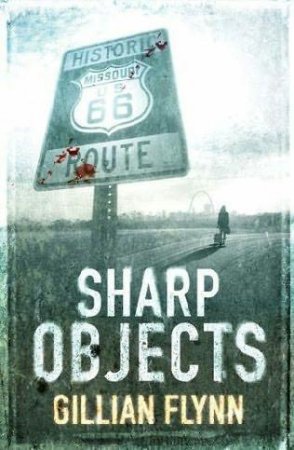 Sharp Objects
Sharp Objects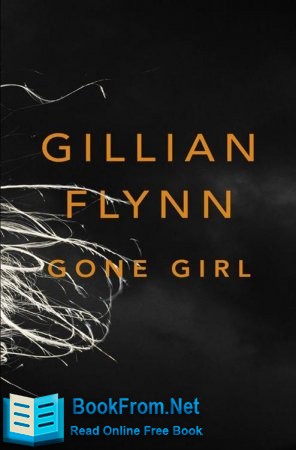 Gone Girl
Gone Girl Dark Places
Dark Places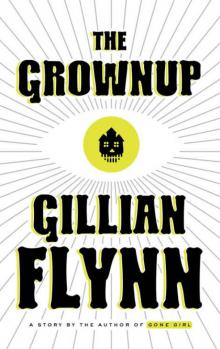 The Grownup
The Grownup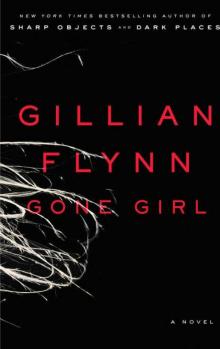 Gone Girl: A Novel
Gone Girl: A Novel The Complete Gillian Flynn
The Complete Gillian Flynn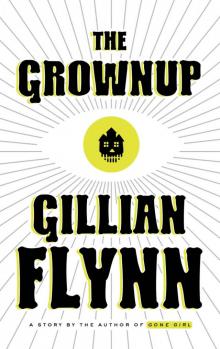 The Grownup: A Story by the Author of Gone Girl (Kindle Single)
The Grownup: A Story by the Author of Gone Girl (Kindle Single)